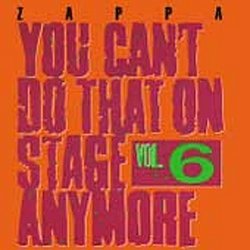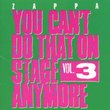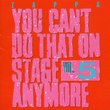| All Artists: Frank Zappa Title: You Can't Do That on Stage Anymore 6 Members Wishing: 6 Total Copies: 0 Label: Vido Arts Release Date: 1/13/2008 Album Type: Import Genres: Alternative Rock, Jazz, Special Interest, Pop, Rock, Classic Rock, Metal Styles: Jazz Fusion, Comedy & Spoken Word, Experimental Music, Progressive, Progressive Rock, Album-Oriented Rock (AOR) Number of Discs: 2 SwapaCD Credits: 2 |
Search - Frank Zappa :: You Can't Do That on Stage Anymore 6
 | Frank Zappa You Can't Do That on Stage Anymore 6 Genres: Alternative Rock, Jazz, Special Interest, Pop, Rock, Classic Rock, Metal
|
Larger Image |
CD DetailsSimilar CDs |
CD ReviewsSome great tracks kireviewer | Sunnyvale, Ca United States | 05/22/2002 (4 out of 5 stars) "This is the last volume of the series. It contains two CD's, each over 70 minutes long. As with the other albums in the series, it is very good but not great. There is too much talking and very few surprises. Almost all of the songs can be heard elsewhere. And these live versions aren't much different than other live versions already on record. He also concentrates too much on certain bands, especially from the Ike Willis era. There are very few or no tracks from the great Adrian Belew, Becker Brothers or Jean Luc Ponty bands. Some songs are repeated a number of times throughout the series, such as the Torture Never Stops.Better live CD's to get would be Make a Jazz Noise Here, The Best Band You Never Heard, and many of the "Beat the Boots" Unfortunately, most of the Beat the Boots CD's have the best concert performances, but the worst sound. Vol 5 of this series is interesting because it contains some very old Mothers material.Volume 6 comes from a wide variety of bands from the early seventies through the eighties. There are some tracks from bands that haven't been represented before, such as the Belew and Becker bands. But, there are only a few of those tracks and they are mostly short. One of the best things about this volume is that it only has a few songs that were repeated from earlier volumes.The first CD of volume 6 contains songs about sex. Included is a bunch of intros where Zappa talks to the audience and two audience participations. The talking parts are very amusing, but you only need to hear them once or twice. There are some very good and unique versions of a few songs on this disc.Disc 2 seems to be the leftovers. Every popular tune that hadn't already been included in the series. But, there are a few nice surprises, such as the fantastic tracks featuring Shankar on violin.I think this is one of the best volumes in the series. The tracks chosen are very lively and full of energy. The only real downside is too much talking." FZ Journal # 13 Jeff Hodges | Denton, TX United States | 06/21/2005 (4 out of 5 stars) "As his last volume in this series, it seems quite obvious that Frank was getting in his last laugh. From the very beginning of Disc one and the "Anti-Smut Loyalty Oath", followed by the infamous "Poodle Lecture" (a meeting of several conceptual continuity clues), he seems set on making a disc that is "about sex" (as he admitted in the liner notes). Disc 1 contains some of Franks most hysterical and conceptually relevant live monologues. "White Person" is a good example of the audible effects of Frank's improvisatory conducting style, and "Make a Sex Noise" shows how Frank could play the crowd. Although the first disc of Vol 6 might be the key to the mythology of Frank's sexual metaphors, disc two sees some of Frank's least accessible stuff. It introduces itself as largely instrumental and improvisatory. The version of "Catholic Girls" here really brings out the best that Ike Willis had to offer. The voice of Joe come up really clearly here, and his backups really bring out the best of Frank's mastery of traditional harmony with the "don't bother Mary" chunk that outlines relatively traditional resolution practices. The voice of the Central Scrutinizer makes an appearance here, too, and the subsequent inclusion of "Crew Slut" is an extension of the "Joe's" storyline. A music education lesson happens in the track "Thirteen". One two One two three one two three four seems almost like a tala based on the Indian idea of an additive phrase, and the entire solo is over a single chord. Frank is also joined on stage by the Indian violinist Shankar. Shankar's background is in the Carnatic style, which uses ragas as a source of melodic expression. It would be interesting to see if Shankar was playing in a raga, and if so, which one. In fact, this is something that I have thought about Zappa recently. It is actually quite rare that we get to hear him over chord changes. Is there a similarity between the expressiveness of raga-based music and the rhythmic displacement that they use to create tension and release in Zappa's methods of improvisation? We're Turning again almost comes off as a tribute to the `60's and his place in it. It seems like it could almost be nostalgic, which begs the question about Zappa's theory that nostalgia is a potentially destructive force in the universe. I still hold that Zappa's stuff is addicting. The more it is scrutinized, the more you feel that you could finally "get it", but the carrot keeps moving just out of reach. " And so it ends... A Hermit | Southwestern Pa. | 03/05/2006 (5 out of 5 stars) "The final chapter in FZ's tribute to all the musicians he has worked with on the world's stages. A lot of these selections are played very fast, and occaisionally sound like they are being rushed through, but you have to take into consideration, these are all live recordings, and they players are probably caught up in the moment. And, as difficult as a lot of Zappa's material is to play properly, the musicians are obviously having a really good time, despite what a hard taskmaster Frank Zappa was.
As stated elsewhere, the first disc in this volume, and some of the second as well, deal primarily with the topic of sex. There is a lot of audience participation on this volume, reminiscent at times of "Tinseltown Rebellion," with selections like "The Madison Panty Sniffing Festival," and all the spoken word parts, like "Farther O'Blivion." He was well-known for going back to earlier material and redoing it with new treatments of similar themes, the format of practically the whole of "Tinseltown Rebellion." And he brought the audience out from their inhibitions, in "Make A sex Noise," and "Tracy Is A Snob." Of course, there are references to egregeous practices, but given a light, humorous take, as in "Lonely Person Devices/Ms. Pinky." Some people can't pull this off, they make you feel dirty after listening, but Zappa's humorous take on these things comes off as well as someone like George Carlin, a true master of language and culture himself. Disc Two is slightly more varied in its content, but holds the same mood as Disc One, basically a performer and his backing band giving the audience a good, entertaining show. There are different incarnations of The Mothers in the series, but they are only represented here, in the 1970-1971 phase, with Howard Kaylan and Mark Volman as lead vocalists, and their critics notwithstanding, two very talented singers, and a couple really funny guys, at that. See "Playground Psychotics" for confirmation of this. As the notes say, there is only one instance of overdubbing in this series, and it is on this volume, The selection featuring Lisa Popeil on lead vocals, called "Lisa's Life Story;" a really strange performance. The drums didn't sound right on the original tape, so to insure a good sounding take, the drums were reworked. Also, as a side note, the only studio work in the series appeared on Volume 5, with some studio trickery inserted in "Right There," Roy Estrada's showpiece of weirdness with the original Mothers Of Invention, and an alternate version of "My Guitar Wants To Kill Your Mama," also the original Mothers, on volume 5, as well. This series is to be taken as a showpiece of the different ensembles Zappa has worked with over the years, and in some instances, the first half of a particular song is edited onto the second half of a different version of the same song, an interesting effect, but in Volume 6, the continuity is interrupted (in my opinion, anyway) with an unusual editing job on "Lonesome Cowboy Nando," which is just a spontaneous reworking of "Lonesome Cowboy Burt," originally from "200 Motels." The original is the "Flo and Eddie" line-up (Flo being Volman and Eddie being Kaylan), featuring Jimmy Carl Black singing. Here, the 1988 band is playing it while Zappa improvises some words about an inside joke that only the guys in the band get and laugh at, but to an outsider, it makes no sense. Nowhere near as funny as Ike Willis' "Lone Ranger" jokes, concerning an old Lenny Bruce routine, which come up at different times in this series. But this performance is intercut with segments of The Mothers playing this song at The Pauley Pavilion in 1971(The show where "Just Another Band From L.A." was recorded ), the same band that played the music for "200 Motels," and it is a far superior performance, compare the two; they are both in this track, back to back. This leads into the "200 Motels Finale," which is actually the second half of the the film's version of "Strictly Genteel," a fast, feel-good jam with references to the film in the lyrics, and, the second disc, this volume, and the series ends with the Halloween performance at the Palladium in New York, of "Strictly Genteel." This was the performance featured on the MTV special in its early days, when MTV still played a variety of music, not the format it now has. The band finishes, Frank says "Good night," and that's it. The end of the series. If one wants to hear the whole series, it is a good idea to buy (or borrow)them in chronological order, as the first volume is a primer to the whole series, two is the Helsinki concert; one show, three is mostly the 1984 band, four goes all over the place, similar to number one, five is a contrast between the original Mothers Of Invention and the 1982 band, and six is the one with all the racy material, a lot of which is pretty funny, and some nice instrumentals. Each one has something to offer, but all six volumes are really for the hard-core fan of Frank Zappa's music and career. R.I.P. Frank." |

 Track Listings (22) - Disc #1
Track Listings (22) - Disc #1




